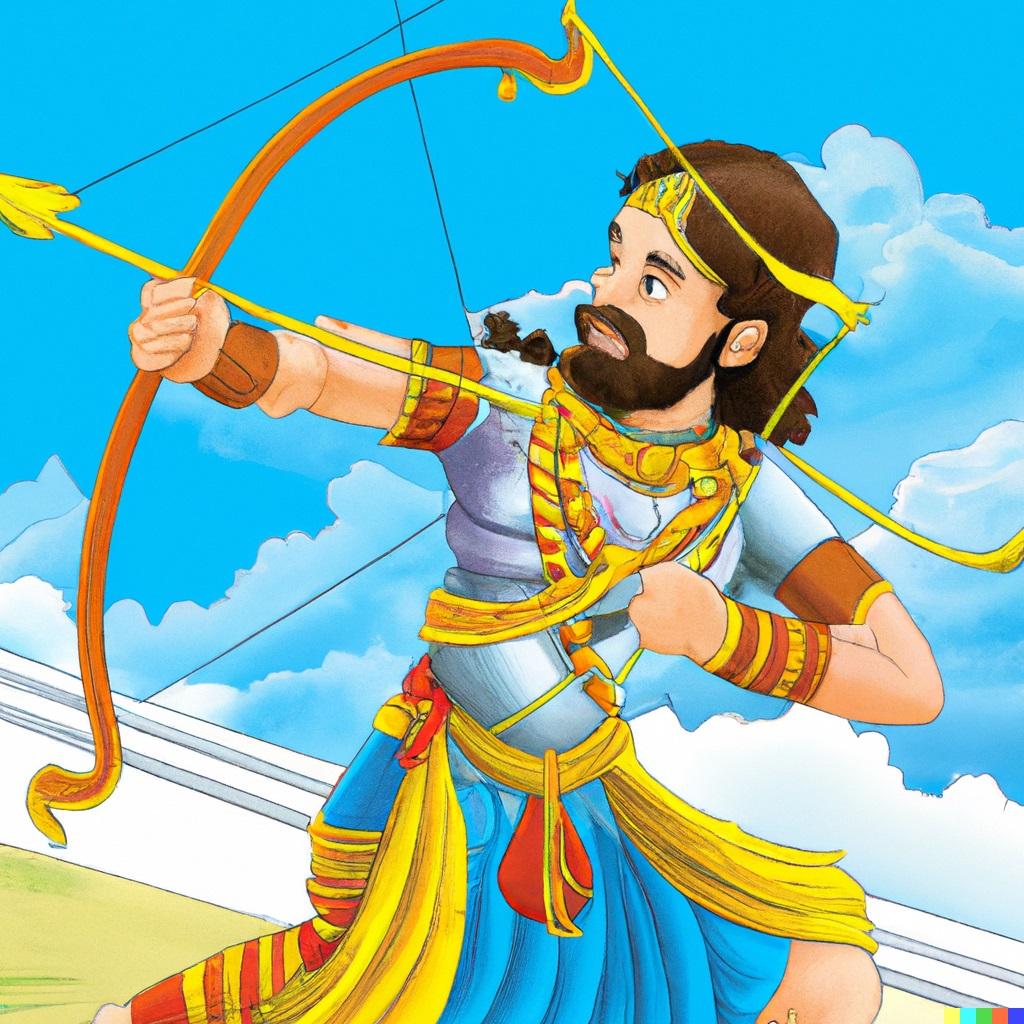
In times of yore, a momentous occurrence unfolded when the venerable sage Durvasa graced the realm of King Kuntibhoja with his presence. Within the confines of the opulent palace, the sage lingered, his visit extending over several days. During this period, a young Kunti, not yet fully emerged into womanhood, took upon herself the noble task of attending to the sage’s needs. It was through her adept service and an innate sense of humility that she managed to capture the sage’s heart. In return for her virtuous devotion, the sage bestowed upon her a mystical mantra, a key capable of beckoning forth any deity and compelling their compliance. This boon became Kunti’s curse, as her childish curiosity led her to invoke the Sun God, ultimately giving birth to Karna, as we’ll explore in detail later in the article.
Kunti Summons the Sun-God
Following the sage’s departure, Kunti found herself in solitude, her contemplative gaze wandering toward the horizon where the sun embarked on its majestic ascent. Yet, an unforeseen transformation had taken place within her – a celestial sight had been bestowed upon her mortal eyes. She perceived, in awe, the personified manifestation of the sun itself, radiating an effulgence that seized her imagination. It was against this backdrop that she began to question the efficacy of the bestowed mantra. Could it truly summon the sun-god himself? Amid her musings, she recited the mantra while summoning thoughts of Surya, the sun deity. In an astonishing twist of fate, her invocations yielded results: Surya, the Sun God, stood before her, casting her chamber in a resplendent glow. The deity, adorned with gleaming bracelets and a regal diadem, possessed a complexion akin to molten gold. With a gracious smile directed at the bewildered maiden, he inquired, “What task shall I undertake at your behest?”
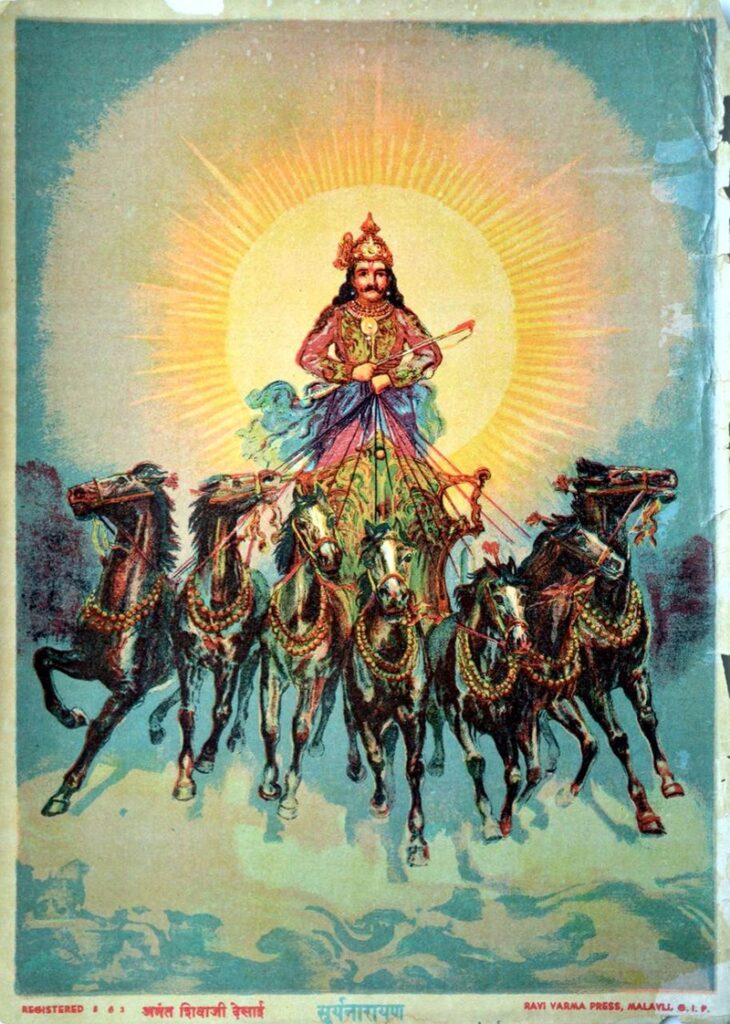
Kunti, nearly overawed by the divine presence, responded timidly, “O lord, return from whence you came. My invocation was borne of mere curiosity, an act of childishness. I beseech your forgiveness for my folly.”
However, the sun-god was unwavering, expressing his intent to grant Kunti a boon before his departure. The tapestry of divine actions, he elucidated, was never devoid of consequences. As Kunti had invoked him with purpose, he vowed to bless her with a remarkable child—endowed with celestial armament and earrings signifying unparalleled might.
Kunti’s astonishment knew no bounds as the deity’s intentions unfolded further. He divulged his yearning for her companionship and hinted at a mutual embrace. However, his advances were met with Kunti’s apprehension and plea, for she feared tarnishing her virtue. Surya remained adamant, delineating the potential humiliation he would face if he departed without fulfilling his desires. Resolute in her commitment to virtue, Kunti continued to resist, seeking a solution that would not besmirch her honor.
In a final effort, she implored, “O sovereign of luminance, how can I avert both sin and societal censure? The sanctity of my lineage and my own rectitude are at stake. Instruct me on a course that harmonizes with virtue.”
Birth and Abandonment of Karna
Surya assured Kunti that her purity would remain unblemished through their union, assuaging her apprehensions. He contended that his intentions were aligned with the welfare of all beings, dispelling any notion of inducing suffering. Persuaded by his reassurances and facing a seemingly inevitable fate, Kunti acquiesced. By the power of his yogic prowess, the sun-god entered her being, rendering her unconscious as he departed.
The passage of ten months heralded the birth of a celestial child, endowed with ethereal earrings and natural armor. Kunti’s predicament was both a joy and a quandary. Although the child was a testament to divine union, how could she justify his existence? Determined to shield her child, she made the arduous choice to part with him. Placing her trust in the sun-god’s benevolence, she released the infant into the flowing embrace of the Ganges.
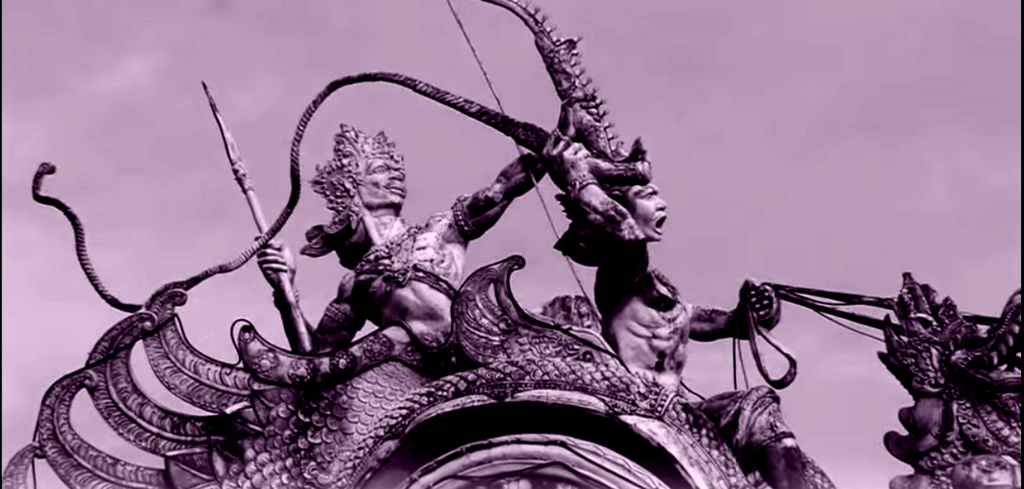
Destiny steered the child’s cradle to the shores of Champa, where Adhiratha, a leader of the suta tribe, stood alongside his wife Radha. The abandoned basket beckoned their attention, revealing within its folds a radiant infant. Radha, longing for a child through her prayers, interpreted this discovery as a divine gift. She nurtured the child as her own, naming him Vasusena, eventually renowned as Karna or Radheya. Thus, a tale woven from the intersection of celestial and human destinies continued to unfold through the ages.
Karna is rejected by Drona
As the chapters of time unfolded, Karna transitioned from youth to manhood, bearing a fervent desire to unearth the arcane mysteries of the celestial weapon brahmastra. He undertook a momentous journey, seeking the tutelage of Drona, the adept teacher of the Kurus. But the words that reverberated from Drona’s lips were fraught with exclusion. The coveted knowledge, Drona professed, was to be imparted solely to those virtuous Brahmins who had ardently followed sacred vows, or to accomplished kshatriyas (Kings and their descendents) who had traversed paths of penance. To Karna, the scion of the suta lineage, Drona’s response was unequivocal: “O Radheya, you fall into neither of these categories. You hail from the stratum of sutas, akin to sudras. Hence, I am barred from divulging the secrets to you.”
Karna approaches Parashurama
Karna, a tempest of anger simmering within him, lowered his head in respect before Drona and embarked on a journey towards the Mahendra mountain. His heart was set on encountering Parasurama, the revered sage who resided there. With reverence akin to devotion, Karna knelt before the sage and implored, “I am a Brahmin hailing from the lineage of Bhrigu. I beseech you to illuminate me in the arts of weaponry and endow me with the knowledge of the brahmastra.”
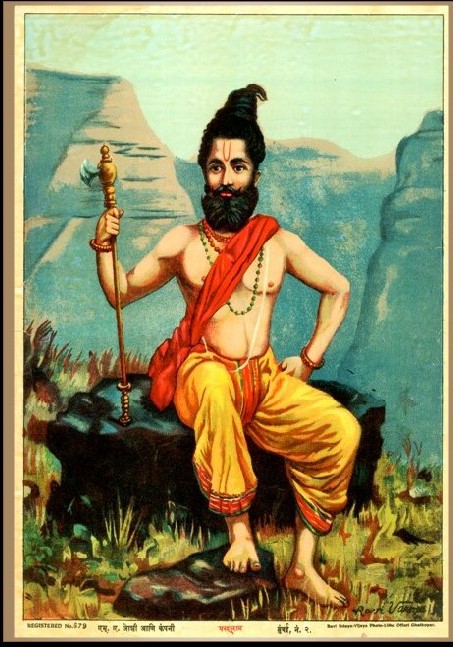
The sage’s benevolence radiated forth, and Karna found himself welcomed within the hallowed sanctuary of Parasurama’s teachings. Residing amidst the sage’s ashram, he imbibed a wealth of martial wisdom, delving into the intricacies of various combat techniques. Amidst the serene embrace of the heavenly mountain, he forged bonds with the Siddhas and Gandharvas, celestial beings who found solace in that realm. With bow and sword as constant companions, Karna would traverse the domain, hunting wild game and confronting the untamed.
Karna becomes Cursed
In a twist of fate, his hunt led to a moment of distress. An inadvertent act resulted in the slaying of a Brahmin’s cow. Consumed by remorse, Karna hastened to the aggrieved Brahmin to confess his deed. With a tearful plea, he sought forgiveness and offered recompense, but the Brahmin’s heart remained hardened. Bereft of solace for his transgression, Karna was met with the Brahmin’s wrathful intent, poised to unleash a curse upon him. The words carried the weight of an impending doom. The brahmin cursed him by saying “Upon the eventual clash with your ultimate adversary on the battlefield, the earth shall consume your chariot whole. Just as you thoughtlessly felled my cow, your own head shall be severed by the hands of your foe”. As Karna endeavored to pacify the incensed Brahmin, his efforts proved futile, and he left, weighed down by the curse’s shadow.
With time, Parasurama’s ashram became Karna’s realm of growth. His earnest endeavors and a disposition brimming with humility endeared him to the sage. Knowledge flowed from sage to student, revealing the secrets of the brahmastra and the potent Bhargava astra.

On a fateful day, the sage and Karna ventured into the verdant woods. Parasurama, weary from his walk, reclined upon a grassy knoll, resting his head upon Karna’s lap. It was in this tranquil repose that an insect found its way to Karna’s leg, embedding itself within his flesh and drinking his blood. Despite the searing pain, Karna remained motionless, unwilling to disturb his revered teacher’s rest.
Eventually, the warmth of his blood roused Parasurama from his slumber, his gaze annihilating the insect. In its wake, a Raksasa emerged, acknowledging Parasurama as his savior and sharing a tale of redemption. The Rakshasa prayed ,’O venerable ascetic, you have liberated me from a tormenting fate. Once, I dwelt amidst loftier realms, until the day I transgressed by assaulting Bhrigu’s spouse. A curse befell me, transforming me into this insect. My plea for clemency was met with a condition to attain redemption upon encountering Rama, the offspring of Jamadagni. Through your benevolence, this debt is discharged. I am profoundly grateful, O sage. I shall now take my leave’.
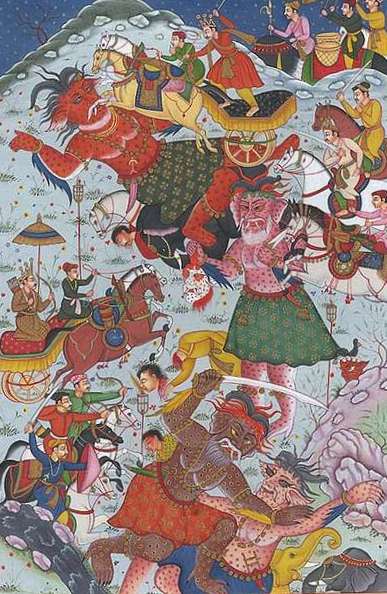
Gratitude echoed through the skies, leaving Karna in the sage’s scrutinizing gaze. “How can you claim Brahmin lineage? No true Brahmin would endure such agony. This steadfast patience is a hallmark of the kshatriyas. Disclose the truth—reveal your identity”, asked Parashurama. A revelation ensued, Parasurama discerning the uncharacteristic demeanor in Karna’s face of adversity. The truth unfolded, unraveling Karna’s woven tale of lineage and aspiration.
The sage’s eyes harbored a blend of mirth and ire as he spoke, his voice an embodiment of reprimand and compassion. Karna, in trembling submission, confessed his deceit, casting his actions in the light of his reverence for Parasurama. Amidst the aura of chastisement, Parasurama’s smile emerged as a harbinger of reconciliation. Acknowledging Karna’s sincerity, he discerned the latent greed that propelled the young aspirant’s falsehood. His words reverberated with prophetic consequence—the mighty weapons Karna yearned for would be within his grasp, yet the crucial mantras would evade his memory in a dire moment. With a final decree, Parasurama bade Karna’s departure from his realm, a realm unsuited for one cloaked in falsehood.
Karna left the sage’s presence, his head bowed beneath the weight of humility and shame. Destiny’s course guided him to the embrace of Duryodhana in the heart of Hastinapura, marking the beginning of a chapter laden with the intricacies of fate and loyalty.